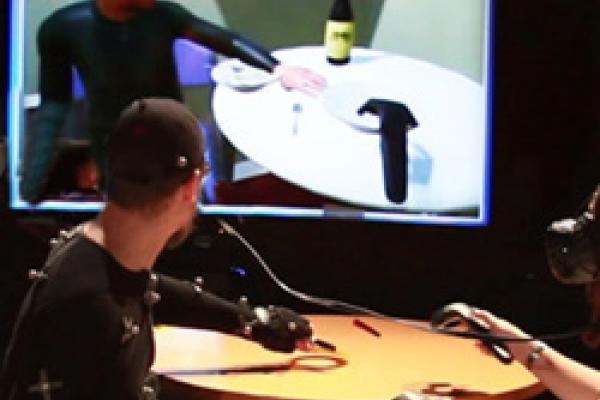Building Empathy in Patient Care with VR Simulation for Practitioners

ACCAD, partnering with the OSU College of Social Work and Wexner Medical Center, received a grant entitled, Building Empathy in Patient Care with VR Simulation for Practitioners.
Project Goals and Objective
VR Experience of Dementia system (VR-ED) developed at Ohio State’s Advanced Computing Center for the Arts and Design (ACCAD) enables immersive scenario-based enactments in VR. VR-ED highlights the effects of short-term memory loss as well as time and place disorientation, which are common dementia symptoms that are difficult to simulate through other forms of dementia care training. The experience provides an experiential insight into the behavior of those living with dementia, engaging practitioners in perspective-taking training to build empathy for patients living with dementia and their caretakers.
Proposed: 1) to immerse practitioners in the VR-ED system as a form of clinical empathy building; 2) the development of a practitioner based workshop module for the existing VR-ED system customized to the needs of empathy training for Medicaid serving physicians, residents and fellows; 3) adaptation of our foundational body tracking system to a consumer-grade system making the existing VR-ED system both affordable and transportable for in facility training.
Using arts-based enactment methods, VR-ED immerses the participant in the role of the person with dementia enabling them to experience “a day in the life” of that person. Inside the VR-ED system the participant is asked by the live actor-driven caregiver avatar to complete simple tasks. Within the VR system we have designed the ability for an operator to seamlessly change aspects of the environment to simulate time dilatations, induce loss of ability to track objects, interrupt conversation and social interactions through time and space to simulate perceptual consequences of dementia. Over the course of the experience, the participant encounters these changes in the virtual environment while dealing with several situations of potential conflict with the caregiver that arise over time.
The immersion experience is held with a ~10 person audience present, so that while a participant experiences direct immersion within the scenario, the audience is engaged through a Mixed-Reality (XR) experience, participating as active observers to both the participant's first person view of the virtual environment (projected on a screen) and the live actions of the participant and actor (Figure 1). At the end of the immersive scenario (approximately 10 minutes) the participant and the audience join a LISW facilitator to partake in a 1-hour interactive workshop that addresses the specific issues of Medicaid serving physicians, residents and fellows. In this workshop, participants discuss, engage and reflect upon the observation and the experience. The workshop acts as a social support system for collaborative problem solving, enhancing the practitioners understanding and development of empathic connections.
